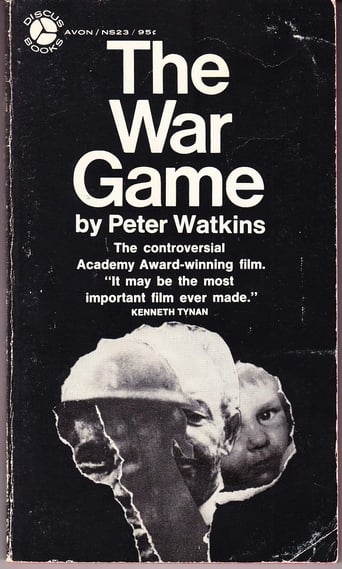framptonhollis
Docudrama, science fiction, and educational broadcasting collide in Peter Watkins' cry against the horrors of nuclear war. The unsteady camera films the disturbing action, the haunting stares of burned survivors of the massive weapons some countries seem to throw at one another in a disgustingly nonchalant manner creep up onto your television. Children bloodied and burned, moans of pain surrounding the empty atmosphere. This is essentially a post apocalyptic world, and it is very much possible."The War Game" will remain relevant as long as war itself remains relevant; it is an important reminder of the great harm that violence upon another civilization will almost always leave to damaging civilian causalities. This is a sad, shocking fact of life that people often gloss over, but they will be reminded of its significance after viewing this masterpiece. The booming, monotone narration contrasts powerfully with the unspeakably horrific imagery that flickers before us. There is no need to go into detail, for this a film that must be seen by everyone. It is among the most realistic, brutal, and brilliant portrayals of a world at war that you will ever see.
Charles Herold (cherold)
Most of the reviews I've seen on this site seem to base their rating of the film on their rating of the film's message. People are horrified by the portrayal of a nuclear war unfolding in England and want to heed the message, in which case they give it 9 or 10 stars, or people dismiss it as propaganda that ignores political complexities and they give it a low score. I believe the message, but I still have mixed feelings about the movie.The film is essentially a docu-drama that lays out how a nuclear war could effect England. It starts quite slowly, with shots of what would happen if the government decided to do mass evacuations in anticipation of a war. The flat narration and fondness for facts gives it a bit of the feel of one of those informational documentaries they showed in school when I was a kid.The movie picks up speed when the bombs drop. We see the initial blast, with people's eyes melted (not being a big special effects movie, we are told the eyes are melted but just see people screaming while covering their eyes). We see what happens to a house 40 miles from the blast. We see a fire storm kill off civilians and firemen. It's pretty grim, and the movie will often point out that what happens in their scenario echoes what has happened in places like Dresden and Hiroshima.This movie was clearly made with the goal of convincing the world that we should get rid of all nuclear weapons. It suggests that the government's preparations for nuclear war and woefully inadequate and that most people have no idea what would happen during such a war. There are also a mix of quotes from those in favor of nuclear weapons, who are made to look foolish, and those against.This is quite effective. But it was probably more effective in the 1960s when this information was less well known. Unless you keep your head in the sand, you should know about the blinding flash, the terrible winds, the deadly radiation, the death on a massive scale.While I appreciate the filmmaker's attempt to warn an oblivious England about the potential for a war that would end life as they knew it, they dry, documentary approach and the blunt polemics make this more effective as a piece of propaganda than as a piece of film making. I don't use propaganda in a pejorative sense, since I approve of the thrust of the film, but the movie is designed as a piece of propaganda, and as effective as the horrific scenes are, the film is still rather stiff and dry.
TheExpatriate700
The War Game, although it follows a hypothetical scenario, is one of the best documentary films ever made. Based on British government documents detailing the probable aftermath of a nuclear war, it is one of the most chilling indictments of nuclear warfare ever made.Unlike later films such as The Day After and Threads, the film does not rely on special effects to get its point across. Made on a minimal budget, it features little to no explosions or spectacle. Rather, we are given the stark vision of human suffering after a thermonuclear exchange.Although the film goes into disturbing detail about the physical toll of nuclear war, the most unnerving parts revolve around the psychological toll, particularly the breakdown of authority and the emergence of mass post-traumatic shock syndrome.Although the film has a definite stance, it benefits from a largely clinical delivery, with most of the polemic elements being used as bumpers between segments. Although the Cold War is over, this film will remain a classic both as a historical document and a warning to future generations.
Bill Peter
I saw this film, as a teenager, at my Grammar School Film Club. It is about the build up to, and the effects of, a nuclear war. The only details that I can remember, and which scared me are; 1. In the event of a nuclear attack on Briain there were (are only four aircraft on full-time standby by to protect the whole country.2. In the film it is the West (the good guys) who make the first nuclear strike.I honestly don't know whether I'd want to watch it again - now over four decades later. Why does IMDb insst on a minimum of ten lines? I could ramble on, and probably will, but it will add nothing to what I've already written. Such people are bad enough in the Civil Service. Why should we have to put up with them here?







